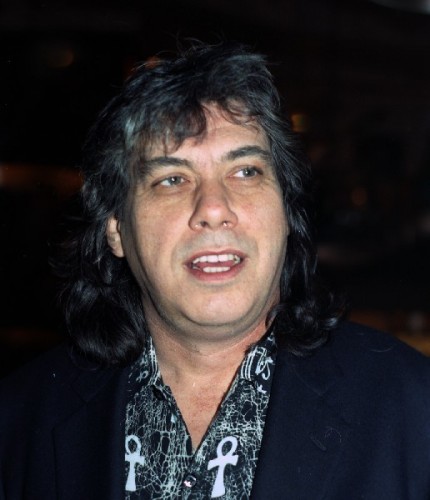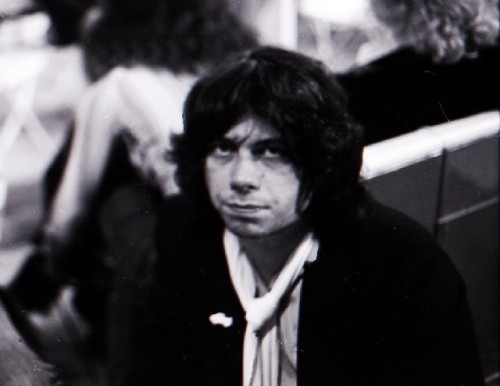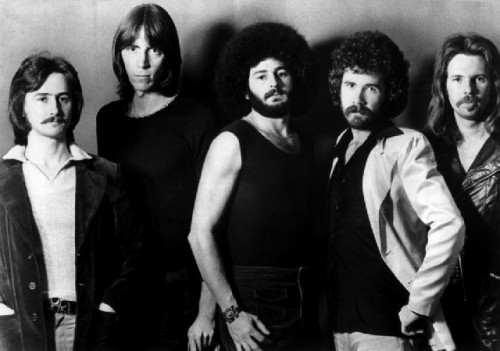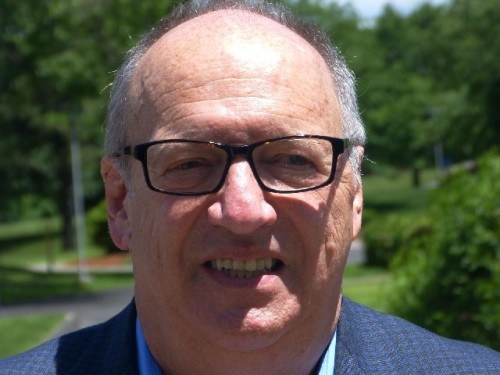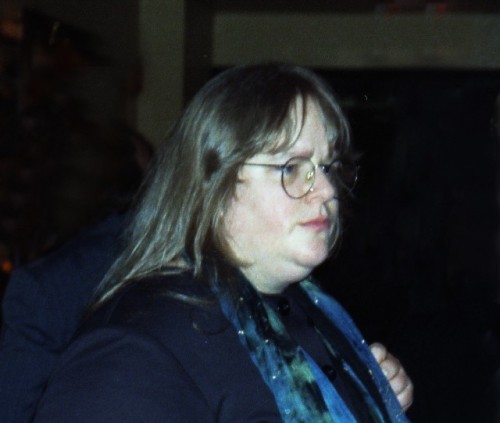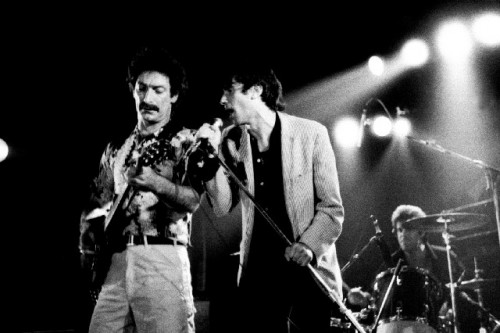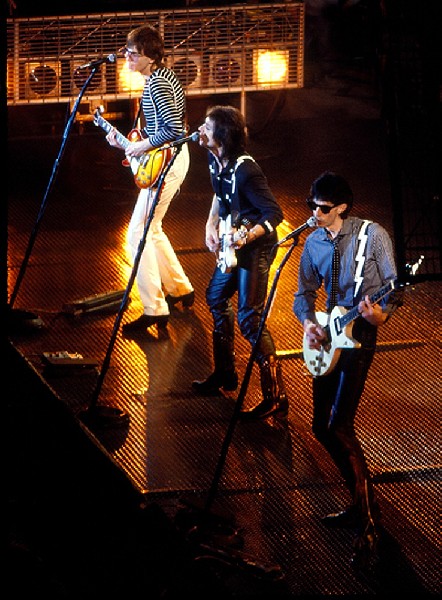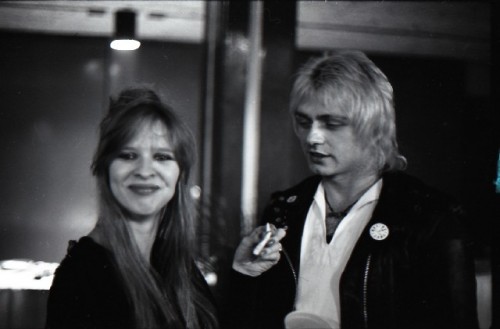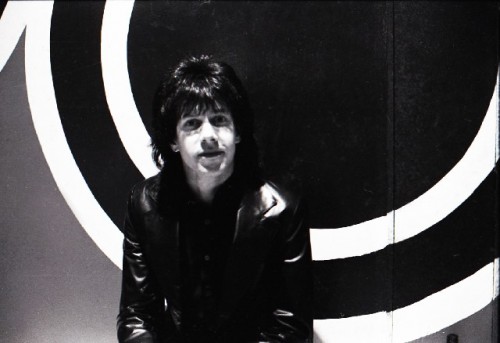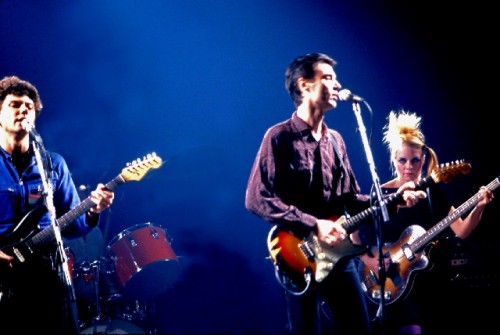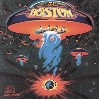Gonzo Chronicles: Roger Lifeset Three
J. Geils, Modern Lovers, Springsteen, The Cars, Boston, Aerosmith
By: Charles Giuliano - Mar 15, 2014
During my peak years of covering rock ‘n’ roll in the 1970s Boston was a breakout town.
WBCN-FM was an adventurous progressive rock station. Its DJ’s were quick to respond to new music. This spawned a lively and aggressive group of promo guys flacking their sides. Mostly they focused on radio but now and then they dropped by print media.
Concert tickets, back stage passes, and invitations to parties all came through the promo guys. It was best to cultivate good working relationships particularly when it came to interviews and access.
Now and then they brought artists to the Herald Traveler for interviews. Blues man Mississippi Fred McDowell was left in my care. There was a note pinned to his shirt with instructions for his next appointment. We hit the South End for shots of ginger brandy and beers. He vividly described making music in the Delta.
There was competition with other writers. Particularly women. DJ John H. Garabedian broke Rod Stewart’s single “Maggie May” from his debut album on Mercury Records. A female reporter not only snagged the exclusive interview but shagged Rod and bragged about it. On another occasion I got a coked out interview with actor Dennis Hopper. That was followed by my former girlfriend who spent the night with him. She got the pillow talk so to speak. Not long after she was killed in a freak accident.
Although technically in competition there was camaraderie and a pack mentality among the promo guys. They would meet in parking lots to swap product from the back of their cars. Among others I recall Walter Lee, Capitol, Don Delacey, RCA, Lennie Peze, Epic, Ed Hynes and Sal Ingeme, Columbia, Roger Lifeset and Charlie McKenzie for Warner Brothers, Paul Ahern of Atlantic, Brian Interland, London Records. .
When the Stones’ Sticky Fingers was released (1977), with the famous Warhol designed zipper in limited edition, Lifeset told me he was handing them out to anyone he met because he was so excited about the album. I got a couple but the zipper damaged the vinyl. Later pressings did not include the real zipper. Today it’s a valued E Bay item.
There was a palpable passion for the music. It was a total life. That meant being out most nights at clubs, concerts and promo parties. Compared to media today I was incredibly productive. In one streak I had a story every day in the Herald for a month in addition to the mandated Sunday feature in the tabloid Show Guide. Today nobody gets that much ink in what’s left of the daily press.
The promo guys roamed the clubs and listened to countless demo tapes looking for breaking bands. Managing a hot band and signing them to a recoding contract was a way out of the grind. Sure it was fun but everyone was on the make for a shot at the brass ring and a whirl on the merry-go-round of fame and fortune.
There was a frenzy when Boston bands were breaking left and right.
Real Paper rock critic Jon Landau heard a band in Harvard Square at Joe’s Place and wrote a review that made history. He signed Bruce Springsteen to Columbia and has continued to be his manager.
Maxanne from WBCN dragged me and others to the Surf on Revere Beach to hear Aerosmith. She was the first DJ to truly believe in the band. At the time I though that Steve Tyler looked and sounded like the Stones. Max hooked up with rocker Billy Squire.
Promo man Freddy Lewis quit to manage the J. Geils Band and then discovered the Cars but later got edged out. I knew Cars drummer Dave Robinson from the Modern Lovers who Arthur Gallagher and I booked for college week in Bermuda. Gerry Harrison moved on to Talking Heads and Jonathan Richman grew ever more eccentric.
But the biggest score, the whole enchilada came, when promo men Charlie McKenzie and Paul Ahern signed Boston. In this third part of the Gonzo Chronicles we talk about that with Lifeset.
Charles Giuliano Let’s talk about the dear departed Charlie McKenzie.
Roger Lifeset That story caught up with you. He wrapped his sports car around a tree so to speak. (March 9, 2002 at 54) It’s true. A big bad ass tree on Cape Cod when he thought he was being pursued by the police. He was being chased by the gendarmes. In those years he had done way too much blow. There were a couple of people who remained close to him. One was promoted John Sdoucous (now living in Florida). Actually Charlie bought Cape Cod property very close to John. I think it was in Hyannisport. There’s another guy now living here in California, Peter Wassing.
CG Wassing used to hang with Peter Wolf.
RL You would never see them separately.
CG When I first met McKenzie he was a big goofy guy. Married. At rock parties he was introduced as “This is Charlie from the Branch.” After a few such occasions I started calling him just “Branch.” He just glared at me.
RL He was tall enough to be a branch.
CG Then you pulled him in to work with you for Warner Brothers.
RL I didn’t pull him in. He pulled himself in. I was OK with it. Charlie was the Promotion Director at the Branch. He had to work there all day. It wasn’t an outside job. It was an inside job. With me, Alberti, Ahern and whatever gone all day. In the morning we started there but got in our cars and hit the radio stations ending up at Daisy Buchanan’s. We were out and never had to come back. Once in awhile there were meetings at the branch but it was an outside job. Charlie wanted that desperately.
Warner Brothers, which was getting bigger, decided that Boston was a big kind of city. We were breaking a lot of music. They decided to beef it up. One of the ways was to bring in my current wife’s former husband, Jim Saltzman, as my RPM (Regional Promotion Manager). He was there to herd me and Charlie who were doing promotion. Then they brought in George Garrity. He was going to organize regional tours and coordinate them with radio. So we had four employees. Then they allowed us to hire, you’ll remember this name, Pamela Burton.
CG She was my neighbor on University Road.
RL That’s right. She became our secretary.
CG At one point she was dating David Bieber (promo director for WBCN). She would make dinner and he would show up at midnight. So that didn’t work.
RL Bieber was probably cataloguing yellowed copies of The Real Paper. (Both laugh)
CG When McKenzie was at the branch he was one of the few guys who actually listened to all the demo tapes.
RL He listened to the Tom Scholz tape after Freddy Lewis left the branch to manage The Cars. When Ahern departed for the Coast Freddy took his Atlantic job. Charlie listened to the tape and really liked it. The tape had made its way all over town. A lot of other promo guys heard it. He passed it to Ahern who by then lived in LA. He was working for Irving Azoff who had connections. (Personal manager, representing recording artists such as Christina Aguilera, the Eagles, Van Halen, Steely Dan, and Lindsey Buckingham of Fleetwood Mac as CEO of Azoff MSG.) Between Charlie and Ahern they really got behind the thing.
(I was close to Ahern’s wife Sandra mother of their son Matthew. Amicably he went off to do his own thing. Sandra had a friend Cathy Holiday who lived with her. We often partied together. Including Halloween. An Aunt Jamima was handing out pancakes. I had two but didn’t know till later that they were doped. Passing out I managed to get home and go to sleep missing all the fun.)
Then they got Lennie Petze who used to be the Epic guy in Boston. He had become an A&R guy for Epic. He’s the guy who signed Boston to Epic.
CG Charlie and Paul got points in the deal.
RL They got points on everything. Yep. They split management.
(Tom Scholz first started writing music in 1969. While attending MIT he joined the band Freehold, where he met guitarist Barry Goudreau and drummer Jim Masdea. They later become members of Boston. Vocalist Brad Delp was added to the collective in 1970. After graduating with a master's degree, Scholz worked for Polaroid. He built a recording studio in his basement. The early demo tapes were recorded with (at various times) Brad Delp on vocals, Barry Goudreau on guitar, Jim Masdea on drums, and Scholz on guitar, bass and keyboards . The demo tapes were sent to but rejected by record companies.
In 1973 Scholz formed the band Mother's Milk with Delp, Goudreau, and Masdea disbanding by 1974. Scholz worked with Masdea and Delp to produce six new demos, including "More Than a Feeling", "Peace of Mind", "Rock and Roll Band", "Something About You" (then entitled "Life Isn't Easy"), "Hitch a Ride" (then entitled "San Francisco Day") and "Don't Be Afraid".
Scholz played all the instruments on the demos, except for drums, which were played by Masdea, and used self-designed pedals to create the desired guitar sound.
This demo tape was used by Ahern and McKenzie. According to Scholz, the managers insisted that Masdea had to be replaced before the band could get a recording deal.Scholz and Delp signed with Epic Records after the band did a live audition for record company executives. The duo recruited Goudreau on guitar, bassist Fran Sheehan and drummer Sib Hashian. The band agreed to put out 10 albums over the next six years.
Epic insisted that Scholz re-record the demo tapes in a professional studio. Scholz wanted to record in his basement studio.Masdea played drums on "Rock and Roll Band", and the instrumentation was recorded in Scholz's studio. In Los Angeles Delp added vocals and the album was mixed by John Boylan. The band was named Boston by suggestion of Boylan and engineer Warren Dewey.)
CG Ahern always struck me as smarter than the rest of the promo guys. He was the brains of the branch. He was always more level headed and career oriented than everyone else. McKenzie on the other hand just went hog wild crazy. He came into enormous wealth and morphed into The Great Gatsby.
RL Yeah. Pretty much.
CG He went face down in the pool like Gatsby. In his case rammed into a tree.
For a time McKenzie was flying high and believed he had the magic touch to discover and promote other bands. But nothing much came of his management ambitions.
RL Willie Loco Alexander. There were other things that he dabbled in.
CG Nothing panned out.
RL He was out every night at the Rat (Kenmore Square) and here and there. He liked being the guy. Hey, that’s Boston’s manager. Hauling around a suitcase full of blow. Yeah. Let the good times roll.
CG He was throwing his weight around at the Rat and the bouncers told him to pipe down. He got in their face saying “Do you know who I am? I manage Boston.” They beat the crap out of him dragged him out and draped him over the hood of his car.
He hooked up with a gold digger who got him for a chunk of change. I knew her but got burned and kept my distance. Early on we went on a date to see The Jackson Five at the old Boston Garden. For a time Charlie dated Elka Bartfield one of my former girlfriends. So there were always odd ties and tensions between us.
When he went large we lost touch. By then I was in graduate school and teaching art history. Gradually I evolved away from the rock life and got serious. But I heard about his Gatsby parties on the Cape and that he was running low on coin. Hard to believe considering the bundle he made. All up his nose partying with an entourage. When you have big bucks there are always hangers on to help you spend it. Before you end up in rehab or go broke and croak. Ah yes, the American dream. “Say hello to my little friend.”
RL It wasn’t that the money ran out. He was popped a couple of times because of the blow.
The last time, the house that he was renting in Hyannisport, the house near John, he was busted there with a large quantity of cocaine. And he was within 500 feet of a school.
CG Uh oh. That’s bad.
RL They were going to throw the book at him. That’s where he was mentally, I believe, when he saw the blue bubble gum machine behind him. They were looking for him because he jumped bail. Whatever he had done. He knew they were coming for him. So he put the pedal to the metal and wrapped himself around a tree.
CG You left for California.
RL I arrived here in January of 1977. I lived the whole Bicentennial thing in Marblehead. Where the “Spirit of ’76” original painting hangs in the Town Hall. The S.S. Constitution spent the night in Marblehead harbor. Then I got a job transfer and said this was great but let’s get out of here.
CG Around that time weren’t you busted for growing pot?
RL I was.
CG (laughing) I heard it stank so much you could smell it from the road.
RL Yup. All of the above.
CG Where were you living?
RL In Ipswich right on Route 1A. (both laughing)
CG You were growing stash in the back yard?
RL I was growing rope. Some of my prime suspects were, oh, I guess, fourteen feet tall.
CG That’s not pot. That’s trees. You were raising lumber.
RL I had no idea what the hell I was doing. This wasn’t manicured stuff. It was just growing and I didn’t want to touch it. It’s beautiful.
CG Did you make any money?
RL On the pot? No. I never made any money. I’ve made some money. Sure. I’ve been in business for myself for 35 years.
CG Do you drive a Porsche on the Freeway?
RL Nope. I don’t put my money into cars. I don’t do anything Charles.
CG Are you happy?
RL Yeah. I have a good wife and a good life. I work on my terms with the cream of the crop in my field. I wouldn’t expect you to know my clients. They’re smooth jazz artists. Which is something I was never into. But I was always into instrumentals. Ones you would know I’m happy to say are Spyro Gyra and Hiroshima.
CG What do you listen to?
RL Little. I only listen to what’s related to my job. You know what I’ve started to do Charles? I’m sure you can appreciate. I was into one medium. Music was it. I love that. I like movies to a certain extent. It all came at the expense of never ever reading. I’ve started reading. I don’t like Kindle. I have a library card and I like going to the library. Unfortunately I’m restricted to large print books. The other ones are too hard to read. I can but it takes the enjoyment away. I’m reading books I should have read a long time ago. I’m reading one right now that I’m sure you would appreciate. I saw a PBS special.
CG On J.D. Salinger. You’re reading Catcher in the Rye.
RL We’re simpatico here.
CG I knew you were going to say that. The Salinger documentary was amazing.
RL I read it a year and a half before it was on TV. When I saw the PBS program I said I have to read that book again. I’m really stimulated by reading and I can’t get that out of music anymore. The music of the 60’s and 70’s was great. Even the 50’s. The music today? Forget about it. It’s over.
CG The music scene we were involved with was great fun but there was absolutely no intellect. You would have conversations and people would say “It was heavy” or “She was a nine.” So this is interesting to me. I always thought you were above the fray and smart. You were smart. Ahern was smart. McKenzie was as dumb as a post. It was almost as though in the rock scene you had to conceal your intellect. You didn’t want people to know about that stuff.
RL I find reading relaxing and very stimulating. I’m not saying that the music ended and I picked up a book. The music ended and I picked up nothing. I picked up a beer or a vodka soda. I particularly like having a library card. It’s an adventure for me to go to the library.
CG I think that there was such a mortality rate in that scene because when we got old and fat and ugly and the party ended for many there was nowhere to go. People were just burned out. You have to get on with the next chapter of your life and not look back. It’s like when you see old fat dudes on Harleys with what’s left of a pony tail.
RL I’m sure there have been many books written about just that subject. It sounds like you are writing about that lost generation or whatever you want to call it.
CG If I ever wrote a novel, and I’ve thought about it from time to time, it would be the fucking Charlie McKenzie story. In a lot of ways Charlie was a paradigm of the phenomenon.
RL This will crystallize your thinking. Charlie’s major thing all those years growing up in Hyde Park was he wanted to be and I’m quoting directly “A teenage millionaire.” That’s what he wanted to be. He and Ahern grew up in the same place. They would run dances. Charlie would. Not Paul. He ran CYO dances. He would run this and that. At the same time he would be a juvenile delinquent. That’s what he wanted to be. And became a teenage millionaire. He wasn’t a teen. It took him another few years. But how old was he?
CG Twenties.
RL Why did it all go south for Charlie? Take the drugs out of the equation. It was because of the band. Boston. Tom Scholtz and his little friends they didn’t party. Charlie was more rock and roll than the band was.
I saw Charlie on the road with the band once. I was working for Warner’s. It was in Pittsburgh. Boston was the headliner and the opening act was Black Sabbath. They were going nowhere even with Ozzie. They didn’t fit in. Pittsburgh they were pretty good but in Boston they didn’t work out. I saw the band and I saw Charlie and they were two different streams.
At the time I remember thinking, Charlie, he has to watch himself a little bit. I don’t care what paper he has with them, these guys, he’s way too much rock and roll for them. It’s not who they are. They’re being good boys.
CG They were a terrible road band. They were strictly studio and sucked live. It was forever before they put out another album. The band went through hell. (There were feuds and singer Brad Delp committed suicide. It resulted in extensive and contested media coverage with cross accusations.)
RL There was a lawsuit a couple of years ago. Boston was the biggest debut album of all time. In the first couple of years it sold 12 million copies. (By now 17 million. All told they sold about 31 million albums.) They couldn’t make a plaque that anyone can carry with all those gold albums on there. It really reflects how much sales they had.
CG It was a heck of a party.
RL Life is good and we’ve moved on.
Gonzo Chronicles: Roger Lifeset One.
Gonzo Chronicles: Roger Lifeset Two.

